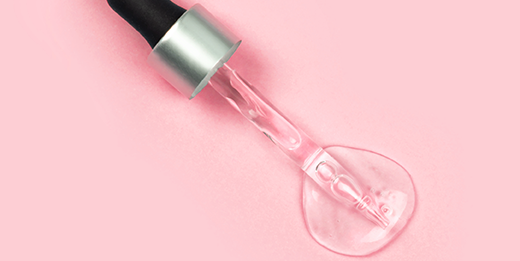Everything You Need to Know About Retinol, According to Skincare Experts

Retinol is often regarded by dermatologists and skincare experts as the "gold standard" ingredient in facial creams and serums because its wide-ranging benefits span from unclogging pores to smoothing wrinkles. "As far as ingredients go, retinol is the most tried and true anti-aging ingredient available over-the-counter," confirms Sandra Lee, M.D., a board-certified dermatologist and founder of SLMD Skincare. But what is the optimal way to use retinol products on your face, and are they even right for your skin type? Below, everything you need to know about retinol, including what it does and how to use it.
First of all, what is retinol?
Retinol is a fat-soluble derivative of vitamin A. "Found mostly in animal foods like whole milk, oily fish and liver, retinol helps your body form and maintain healthy skin, plays a role in regulating the immune system and can even protect against infection," says Stefani Sassos, M.S., R.D., Registered Dietitian for the Good Housekeeping Institute.
In skincare, retinol is an OTC version of prescription-strength tretinoin, also known as retinoic acid, which is often prescribed by dermatologists for acne treatment and anti-aging purposes, according to Dr. Lee.
Both retinol and retinoic acid fall under the umbrella of a group of vitamin A derivatives called retinoids. While retinol can induce similar benefits to prescription retinoic acid, it is weaker and therefore less irritating. Some dermatologists recommend starting with retinol to let your skin acclimate to the ingredient. But you don't necessarily need to be using prescription-strength retinoids to reap their benefits. Plus, retinols are available at a fraction of the cost of prescription retinoic acid and you don’t need to schedule a doctor's visit to use them.
What does retinol do exactly?
"Retinol works a few different ways in skin," says Dr. Lee. "It prevents the breakdown of collagen, simultaneously encourages rapid cell turnover, and thickens the subcutaneous layer of the skin, which is where wrinkles originate."
Collagen and elastin are proteins in skin that are responsible for keeping your complexion plump and elastic. When applied to your face, retinol inhibits collagen breakdown and is thought to stimulate the production of both collagen and elastin, which can help with the appearance of fine lines and wrinkles.
A study published in the Journal of Drugs in Dermatology showed that a 0.1% retinol moisturizer used once daily significantly improved the appearance of fine lines, pigmentation, elasticity, firmness and photo-damage at 8 weeks, compared to the control moisturizer without retinol.
Retinol also has keratolytic properties, meaning it promotes skin cell turnover and "in this way helps to keep pores clear and prevents the formation of blackheads and whiteheads," says Dr. Lee. In addition to keeping acne at bay, this function can also help "improve skin tone and fade dark marks, which leaves us with fresh skin and that 'glow' we are all searching for."
It's important to note that there is some debate about what age it's best to start using retinol products. Although many people know retinol as an ingredient for mature skin, Dr. Lee says that doesn’t mean you should wait for signs of aging to use it. It's best to speak to your dermatologist if you're unsure if retinol is right for you.
What side effects does retinol have?
Retinol is safe for all skin types, but "some may experience drying, redness, and irritation, which is common especially if it's your first time using retinol," says Dr. Lee. Therefore, it is best to start off slow. Also, because retinol increases cell turnover pushing delicate new skin to the surface, it can potentially cause skin to become more sensitive to the sun. Therefore, it is important to apply sunscreen every day when using a retinol (and always).
What's the best way to use retinol?
Retinol has traditionally been used at night. The theory is that your skin repairs itself as you sleep, so any anti-aging ingredients you use will be more effective if you apply them before bedtime. Sunlight and retinol are not BFFs, either: In addition to retinol causing sun sensitivity, UV rays have been thought to degrade retinol, decreasing its effectiveness. That said, more and more daytime moisturizers now contain retinol and SPF (like one of the GH Beauty Lab's top picks, Neutrogena Rapid Wrinkle Repair Moisturizer SPF 30). These types of formulas typically contain a stabilized retinol to decrease the degradation by light and ensure efficacy.
With any retinol product, start slow by alternating nights of application and then increase the frequency to nightly, once your skin adjusts. "Usually, your skin will adjust with time," says Dr. Lee. You can also try applying a moisturizer before your retinol product to minimize irritation. Of course, as with any skincare product, be sure to follow the manufacturer's directions on the label for proper application and best results.
What is the best retinol product to use?
Retinol is sensitive to air, heat and light, which can cause it to become less effective. So it's important to look for products with opaque and airtight packaging or look for "encapsulated" on the label to ensure efficacy. It's also important to note that there is no specific percentage of retinol that's "most effective." How well the ingredient works depends on a product's entire formulation, and higher percentages aren't always better.
How long does it take to see results?
"Different ingredients often included in a retinol product can contribute to immediate skin improvements, but overall, it usually takes around 10-12 weeks to start seeing results," says Dr. Lee.
You Might Also Like

